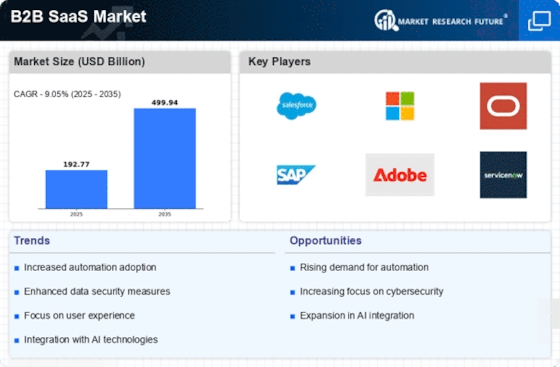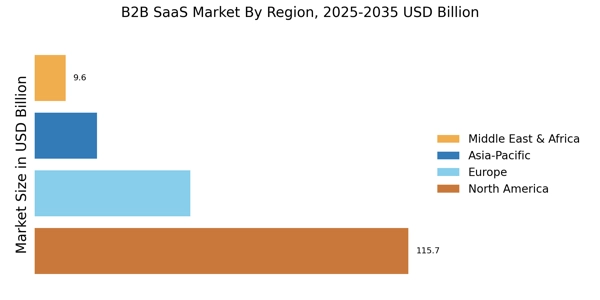Growing Emphasis on Data Analytics
In the B2B SaaS Market, the growing emphasis on data analytics is reshaping how businesses operate. Organizations are increasingly leveraging data-driven insights to inform decision-making processes. The demand for analytics tools is expected to rise, with the market for business intelligence software projected to reach 30 billion dollars by 2026. This shift suggests that companies are recognizing the value of harnessing data to optimize operations and enhance customer experiences. B2B SaaS providers are responding by integrating advanced analytics capabilities into their offerings, enabling clients to derive actionable insights from their data. As a result, the B2B SaaS Market is witnessing a transformation where data analytics becomes a core component of service delivery.
Increased Focus on Customer Experience
The B2B SaaS Market is witnessing an increased focus on customer experience as a key differentiator. Companies are recognizing that delivering exceptional service can lead to higher customer retention rates and increased revenue. Research indicates that organizations prioritizing customer experience are 60% more profitable than those that do not. This trend compels B2B SaaS providers to enhance their user interfaces and customer support services. By investing in customer experience, these companies can foster loyalty and drive long-term growth. Furthermore, the emphasis on customer feedback loops allows SaaS providers to continuously improve their offerings, ensuring they meet evolving client needs. This focus on customer-centricity is likely to shape the competitive dynamics within the B2B SaaS Market.
Rising Demand for Remote Work Solutions
The B2B SaaS Market experiences a notable surge in demand for remote work solutions. As organizations increasingly adopt flexible work arrangements, the need for cloud-based collaboration tools has intensified. According to recent data, the market for remote work software is projected to grow at a compound annual growth rate of 22% over the next five years. This trend indicates that businesses are prioritizing tools that facilitate communication and project management among distributed teams. Consequently, B2B SaaS providers are innovating to offer comprehensive solutions that enhance productivity and streamline workflows. The emphasis on remote work not only drives revenue growth for SaaS companies but also fosters a competitive landscape where adaptability and user experience become paramount.
Integration of Advanced Security Features
In the B2B SaaS Market, the integration of advanced security features is becoming increasingly critical. As cyber threats evolve, businesses are prioritizing the protection of sensitive data. Recent statistics indicate that 60% of small to medium-sized enterprises experience a cyber attack each year. This alarming trend compels B2B SaaS providers to enhance their security protocols, offering features such as encryption, multi-factor authentication, and compliance with industry standards. By addressing security concerns, these companies can build trust with their clients and differentiate themselves in a crowded market. The focus on security not only safeguards client data but also positions B2B SaaS providers as reliable partners in an era where data breaches can have devastating consequences.
Adoption of Subscription-Based Pricing Models
The B2B SaaS Market is increasingly characterized by the adoption of subscription-based pricing models. This shift allows businesses to access software solutions without the burden of large upfront costs. Data suggests that subscription revenue in the SaaS sector is expected to surpass 200 billion dollars by 2025. This model not only provides predictable revenue streams for providers but also offers flexibility for clients, enabling them to scale services according to their needs. As organizations seek cost-effective solutions, the subscription model is likely to become the standard in the B2B SaaS Market. This trend may also encourage innovation, as providers strive to deliver ongoing value to retain subscribers.

















